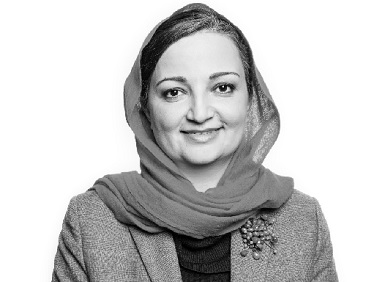Seema Ghani
Chair, Hand in Hand Afghanistan

Seema is winner of Bond’s Outstanding Individual Award, 2017
Seema Ghani’s story begins like millions of others: on the crowded road out of Afghanistan at the outset of war. But the path she took was utterly her own.
Seema fled Afghanistan for London in the 1990s during the country’s 20-year Civil War, and went on to build a career working with some of the City’s biggest Fortune 500 companies.
A life of comfort, hard-earned in the private sector – that was the plan.
Then came 11 September 2001, and plans changed.
Seema moved back to Afghanistan just weeks after the Taliban was toppled, eager to help her country rebuild. In 2002 the BBC caught wind of the quixotic City consultant in war-torn Kabul, and profiled her on the evening news.
“I’m very optimistic,” she told them. “I don’t think anyone will give up on Afghanistan again, whether they’re Afghans or not.”
Seema certainly didn’t. Today, she can claim to have made a lasting impact on tens of thousands of lives throughout the country, among some of Afghanistan’s poorest residents. But her efforts started rather more modestly – and closer to home – with the adoption of 16 children aged 3 to 17, all orphaned by war and vulnerable to disease, hunger and exploitation.
“It’s a family I’ll be living with forever and ever,” says Seema.
Outside of her extraordinary home Seema was growing more and more fed up with the corruption that mars so much of Afghanistan’s public life. With her background in business she founded the People’s Movement Against Corruption in Afghanistan, and in 2008 joined Hand in Hand Afghanistan as Chair.
Second only to Syria, Afghanistan compels more refugees into Europe than any other country, according to the Financial Times.
“You can’t force people to stay in the country. If they need jobs and there’s unemployment they will end up leaving,” explains Seema. “In the worst-case scenario they join the Taliban, because the Taliban supports people.”
But where others see poverty Seema sees grassroots entrepreneurs, full of energy and ideas. Under her guidance, Hand in Hand Afghanistan’s formula of business skills training and asset transfer has led to the creation of more than 26,500 businesses, 30,500 jobs and 198,000 improved lives for job holders’ dependents. That’s thousands of families less likely to leave the country, thousands of men and boys less susceptible to Taliban recruiters.
Women’s empowerment has been another key feature of Seema’s leadership. Hand in Hand’s female participation rate in Afghanistan is 50 percent – significantly higher than the national rate of 16 percent. In some projects, the rate has surpassed 70 percent – an achievement one independent evaluator called “incredible”.
Afghanistan is the world’s most dangerous place to do aid work, according to the Aid Worker Security Database. Seema, however, has not lost her optimism.
“At the end of the day you can’t live without hope,” she says.
Seema is available to speak to the media about job creation, the refugee crisis and insecurity in Afghanistan. To arrange an interview, or to speak with another one of our experts, please contact Ann Dickinson (below).
